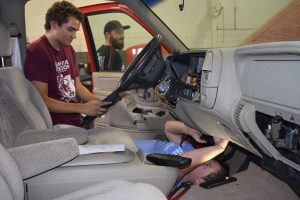(WACO) – Carlos Encarnacion of Waco walked into Texas State Technical College with knowledge about electrical engineering from having earned a bachelor’s degree at a four-year university.
But Encarnacion, 27, said he had difficulties finding a job in his field and needed a plan. He followed a hobby for working on vehicles into working on an automotive technician certificate and is scheduled to graduate in December.
Some of Encarnacion’s hands-on learning involves troubleshooting the hardware in vehicles. On a recent day, he worked with other students outside one of the Automotive Technology program’s garages searching for a bad sensor.
Encarnacion said he has been impressed at how far technology has progressed in vehicles.
“It is almost impossible to keep it in memory,” he said. “You have to do research to keep up with it. I find it amazing that 15 years ago you were lucky to have a television screen in the back. The possibilities are endless.”
Students in TSTC’s Automotive Technology program take classes in electrical systems and learn about wiring diagrams, manufacturer service information and networking.
“We don’t write code so we can’t change the software,” said Thomas Breshears, an instructor in the Automotive Technology program. “We have to know software to figure out the hardware. If one manufacturer does something, the rest will do the same thing.”
Manufacturers are moving toward having software updates downloaded through in-vehicle radio systems.
“They are planning to do that for all modules in vehicles in the future,” said Eric Upton, service director at Allen Samuels Dodge Chrysler Jeep Ram in Waco. “They are trying to work out the kinks globally.”
Students who enter the Automotive Technology program should have good reasoning and mathematics skills, Breshears said.
Upton said prospective employees need a basic understanding of mechanics to do standard repairs. But, service technicians should feel comfortable troubleshooting and replacing modules for vehicle functions, such as window switches. Manufacturers typically have their own training for employees to learn the technical specifics of their products.
Service technicians are seeing more vehicles with integrated mobile phone capabilities.
“As technology increases, the cybersecurity portion of it is not a huge threat yet, but I would strongly suspect in another 10 years it is going to be a lot more prevalent,” Upton said.
The Security and Privacy in Your Car Act of 2017 sponsored by Sen. Edward J. Markey, D-MA, is currently in the U.S. Senate’s Committee on Commerce, Science and Transportation. The proposed legislation calls for the National Highway Traffic Safety Administration to mandate vehicles with accessible data or control signals have the capability to detect, report and stop security breaches to driving operation and data.
For more information on Texas State Technical College, go to tstc.edu.
